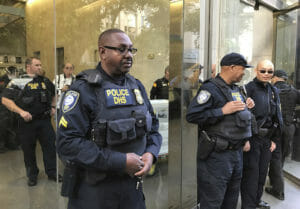Company Stifles Consumer Complaint Via Secret Court Filings
A company disagreeing with a consumer complaint posted on a federal website has gone to court to have the information removed. And it persuaded a federal judge to cloak the company, and the effort, in secrecy. The case is heading to the appeals court. So much for a transparent legal system.
So much for a transparent legal system.
We already know that the federal government’s spying programs get their own legal system — a secret one, at that — as they go about snooping into the world’s electronic communications.
But FairWarning reports on a consumer product safety case in which the plaintiff, Company Doe, has managed to persuade a federal judge to withhold all the crucial details of the case — including the allegation — because, Company Doe says, the allegation is false.
Isn’t that what the court is supposed to decide?
In this case, the legal proceedings are moving forward, but no one knows who is suing whom over what. You kind of hope that Franz Kafka is one of the lawyers.
FairWarning, a nonprofit consumer watchdog journalism site run by former Los Angeles Times reporter Myron Levin*, sums up the issue this way:
The complicated dispute began with a complaint filed with SaferProducts.gov, a Consumer Product Safety Commission website launched in March 2011 to let consumers report and learn about hazardous products.
The company targeted in the complaint responded by going to court to keep the matter private on the grounds that the complaint was inaccurate and would harm its reputation. The company won an initial ruling, but then the consumer and media groups took the case to the appeals court, where the judicial transparency issue is being weighed by a three-judge panel.
As FairWarning has reported, thanks to the sealed records, closed-door hearings and a 73-page ruling with large sections blacked out, even the most basic details have been concealed. That includes the identity of the plaintiff — known only as “Company Doe” –along with its product, the incident that led to the complaint and the government agency that filed the complaint.
Apparently the CPSC’s investigators concluded there wasn’t much to the complaint, but that doesn’t give the company a claim to secrecy. The focal point is the SaferProducts.gov site, which allows consumers to post complaints, but with 17,000 incident reports the CPSC doesn’t investigate them all, and the site carries a disclaimer to that effect. So someone could post unsubstantiated complaints about a firm. But is that a reason for a judicial blackout?
The appeal pits business groups backing Company Doe against consumer groups and some media outlets, including The New York Times and The Washington Post, which are presumably concerned about the precedent this might set. Imagine a court system in which one of the parties can argue the other is wrong or lying, and thus the records are sealed. That would pretty much cover any case going to trial.
—Posted by Scott Martelle.
*Disclaimer: Levin is a professional acquaintance; we both worked at the Los Angeles Times.
Your support matters…Independent journalism is under threat and overshadowed by heavily funded mainstream media.
You can help level the playing field. Become a member.
Your tax-deductible contribution keeps us digging beneath the headlines to give you thought-provoking, investigative reporting and analysis that unearths what's really happening- without compromise.
Give today to support our courageous, independent journalists.







You need to be a supporter to comment.
There are currently no responses to this article.
Be the first to respond.